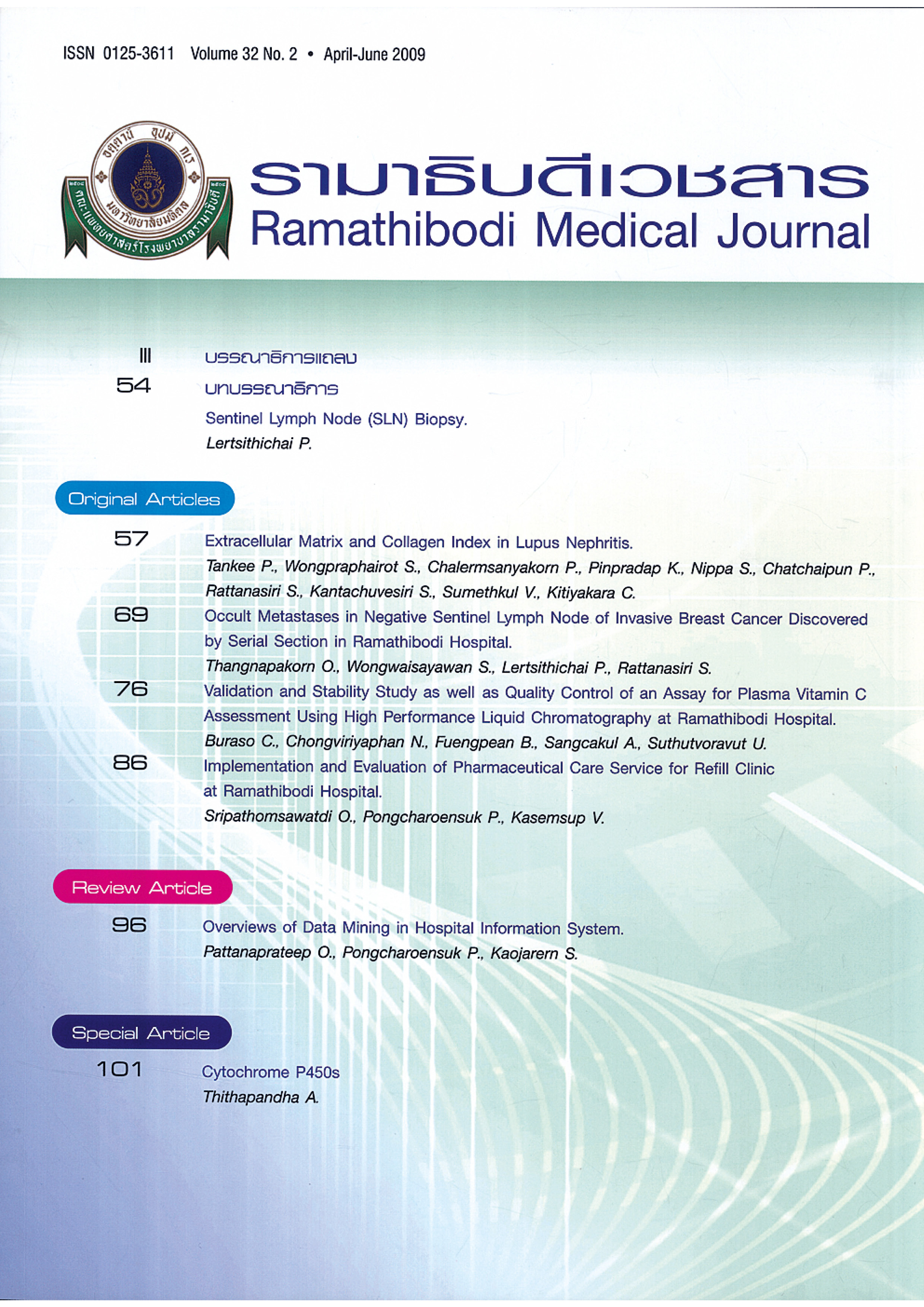Implementation and Evaluation of Pharmaceutical Care Service for Refill Clinic at Ramathibodi Hospital
Main Article Content
Abstract
A pharmaceutical care service (PCS) was initiated at refill clinic, Ramathibodi Hospital. The objective of this study was to implement and evaluate PCS program using Donabedian's (Structure-Process-Outcome) conceptualization. The study was divided into 4 phases; 1) project initiation, 2) preparation, 3) implementation, and 4) program assessment.
The project was approved in March 2007. In the preparation phase, all structures, work place, facilities (such as computer software), pharmacists, and work process were planned for the provision of PCS. During the one-year implementation phase (July 2007 to June 2008), a total of 2,155 patients with chronic diseases and stable condition were recruited to receive PCS together with refill prescribing process. The pharmacists recorded prescription data, provided pharmaceutical care services to 2,809 encounters, and gave 3,345 refill prescriptions. Between October 2007 and June 2008, 1,545 of the 2,548 encounters (60.64%) were returned for refills. Of these, 1,111 encounters (71.91%) were refilled with PCS process. For clinical outcomes, pharmacists interviewed 154 patients and identified 72 DTPs, 61.11% of which were non-compliance. When interventions are recommended for the problems, physicians accepted 86.36% of pharmacists' recommendations. For economic outcomes, benefit as drug cost saving (from duplicates and oversupplies) was 419,214.48 Baht and the benefit to cost ratio was 2.45 : 1. For humanistic outcomes, 95.2% of the respondents recommended their relatives or friends with problems or doubts about medication to receive PCS.
In conclusion, PCS could reduce DRPs and save drug cost. It is recommended that the program should be expanded to cover other groups of patients so as to achieve more efficient use of health resources.
Article Details
References
Hepler CD, Strand LM. Opportunities and responsibilities in pharmaceutical care. Am J Hosp Pharm. 1990;47(3):533-543.
Zermansky AG, Petty DR, Raynor DK, Lowe CJ, Freemantle N, Vail A. Clinical medication review by a pharmacist of patients on repeat prescriptions in general practice: a randomised controlled trial. Health Technol Assess. 2002;6(20):1-86. doi:10.3310/hta6200.
Levy RA. Failure to Refill Prescriptions. In: Cramer JA, Spiker B, editors. Patient Compliance in Medical Practice and Clinical Trials. New York: Raven Press; 1991:11-8.
Andersson K, Melander A, Svensson C, Lind O, Nilsson JL. Repeat prescriptions: refill adherence in relation to patient and prescriber characteristics, reimbursement level and type of medication. Eur J Public Health. 2005;15(6):621-626. doi:10.1093/eurpub/cki053.
Nilsson JL, Andersson K, Bergkvist A, Björkman I, Brismar A, Moen J. Refill adherence to repeat prescriptions of cancer drugs to ambulatory patients. Eur J Cancer Care (Engl). 2006;15(3):235-237. doi:10.1111/j.1365-2354.2006.00645.x.
Krigsman K, Melander A, Carlsten A, Ekedahl A, Nilsson JL. Refill non-adherence to repeat prescriptions leads to treatment gaps or to high extra costs. Pharm World Sci. 2007;29(1):19-24. doi:10.1007/s11096-005-4797-8.
Stroupe KT, Teal EY, Tu W, Weiner M, Murray MD. Association of refill adherence and health care use among adults with hypertension in an urban health care system. Pharmacotherapy. 2006;26(6):779-789. doi:10.1592/phco.26.6.779.
Granas AG, Bates I. The effect of pharmaceutical review of repeat prescriptions in general practice. Int J Pharm Pract. 1999;7(4):264-275. doi:10.1111/j.2042-7174.1999.tb00978.x.
Bond C, Matheson C, Williams S, Williams P, Donnan P. Repeat prescribing: a role for community pharmacists in controlling and monitoring repeat prescriptions. Br J Gen Pract. 2000;50(453):271-275.
Zermansky AG, Petty DR, Raynor DK, Freemantle N, Vail A, Lowe CJ. Randomised controlled trial of clinical medication review by a pharmacist of elderly patients receiving repeat prescriptions in general practice. BMJ. 2001;323(7325):1340-1343. doi:10.1136/bmj.323.7325.1340.
Manomayitthikan T, Tangsucharit P, Laowachirasuwan C, Samkaew T, Butarin P, Chaichun J. The economic outcomes of pharmaceutical ambulatory care unit in saving drug expenditures of cardiovascular patients. Thai J Hosp Pharm. 2006;16:121-30.
Thiravudh M, Wongpoowarak P, Reanmongkol W. Effects of antihypertensive drug refilling by primary care unit pharmacist at Thepa district. Songkla Med J. 2007;25(4):303-313.
Pokaprakorn J. Antiretroviral refilling system by pharmacists in HIV infected patients at Sena Hospital [master thesis]. Bangkok: Faculty of Graduate Studies, Chulalongkorn University; 2004.
Policy & Planning. Annual Report. Bangkok: Faculty of Medicine Ramathibodi Hospital, Mahidol University; 2006.
Donabedian A. The quality of care. How can it be assessed?. JAMA. 1988;260(12):1743-1748. doi:10.1001/jama.260.12.1743.
Strand LM, Cipolle RJ, Morley PC, Frakes MJ. The impact of pharmaceutical care practice on the practitioner and the patient in the ambulatory practice setting: twenty-five years of experience. Curr Pharm Des. 2004;10(31):3987-4001. doi:10.2174/1381612043382576.
Fincham JE. Pharmaceutical care studies: a review and update. Drug Benefit Trends 1998;10:41-45.
